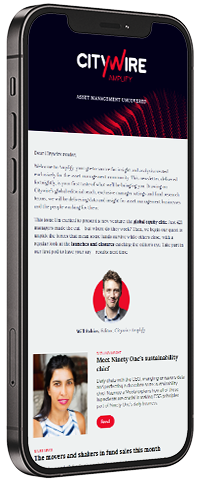There might be light at the end of the tunnel, but it ain’t here yet.
Why managers should only buy 5 stocks… and why they shouldn’t

Latest Newsletter
Value stance rewards managers with first AAA rating
The year comes to a close with a host of managers gaining their AAA wings.
Real Life: A cheaper, smarter way to fly business to the US
Companies are clamping down on travel costs. Here’s how to travel in comfort while keeping the expenses department happy.
Community
The ability of fund managers to reliably generate market-beating returns is limited to three to five stocks.
These are the conclusions of Harvard Business School senior lecturer Randy Cohen, who has been conducting a study into the performance of fund managers’ ‘best ideas’ over the last 15 years.
‘What you see when you look at the data is that after fund managers’ third, fourth or fifth best idea, everything starts to look pretty much like the market performance,’ says Cohen.
‘These folks are putting about 100 stocks in a portfolio and only a few are creating outperformance.’
Cohen, along with colleagues Christopher Polk of the London School of Economics and Miguel Antón of the University of Navarra, IESE Business School, originally published their Best Ideas paper in 2009 and have been updating it ever since. During that time, as well as extending their original dataset on the historical holdings of US mutual funds from 1983 to the end of 2018, they have added a further dataset on hedge funds.
The headlines from the study are that the best ideas have generated statistically and economically significant risk-adjusted returns and systematically outperformed the other positions in managers’ portfolios. The findings are consistent across different benchmarks, different risk models, and different definitions of what constitutes a best idea. And while the level of outperformance varies depending on different assessment methods, it primarily falls in the range of 2.8-4.5% a year.
There have been other studies since the original Best Ideas paper came out that appear to support the findings.
Best ideas research
- Read the latest version of Cohen, Polk and Anton’s study here.
- In 2019, Farouk Jivraj, then head of investment strategies research at Barclays Investment Bank, with his then Barclays colleague Mobeen Iqbal and Luca Angelini of Novus Partners, reported that a best ideas strategy, which combined conviction and consensus and was based on 13F filings of hedge fund managers with longer-term views on stocks, outerpformed the S&P500 by 3.8% a year between May 2004 and June 2019 and delivered a Sharpe ratio of 0.75.
- In 2012, academics Russ Wermers and Tong Yao, along with investor Jane Zhao, published findings that stocks that were held in greater weight on aggregate by previously successful managers tended to outperform.
- In 2019, a study by Alexey Panchekha of Turing Technology Associates of 114 funds covering more than 400,000 rolling one-year periods, found portfolios of high-conviction overweight positions outperformed their respective benchmarks 74% of the time after accounting for notional fees. The average annualised excess return was 2.8%.
Get real!
If the studies by Cohen and others are correct, why don’t funds only invest in their best ideas?
The most prosaic reason for a lack of five-stock funds is that industry regulators would flip out at the sight of them. But even ignoring this most practical of problems, sooner or later, any fund manager that did crank up portfolio concentration to such a degree could expect to get the sack.
Even portfolios of the five best-performing stocks over the long term are highly likely to produce long-enough periods of gut-churning disappointment to ensure a rush to the exit. Past industry fads for concentrated ‘best ideas’ funds have ended badly.
What is more, restricting investments to a handful of stocks would reduce the ability to build a fund business of reasonable scale due to the limits it would put on liquidity.
‘From a fund manager’s perspective, it is not good business to be concentrated,’ says Cohen. He sketches a somewhat radical alternative solution.
‘Imagine we divide the world into 10 regions and then into 10 broad industries. Now you have a grid with 100 boxes. Let’s say you found managers that would give you a bespoke five-stock portfolio for each of those areas. Now you have a 500-stock portfolio. So, you are very diversified, but you have not just captured the whole market. In each part you own an ultra-concentrated portfolio picked by an expert.
‘Institutional investors should say to managers: “Give me your five best ideas”. The manager says: “How about 100?” and they compromise on 20 to 25 and a higher fee. Instead, what sometimes happens is the manager says: “I’ve got 100 names”, and the institutional investor says: “Could you make it 150?”’
What is a best idea?
The question of what constitutes a best idea is a tricky one.
Given the longevity of Cohen’s project, he regrets rejecting an early thought to ask managers to regularly submit best ideas to build a dataset. Instead, he and his collaborators settled on inferring what managers’ favourite stocks were by looking at overweight positions and associated risks.
‘What we came up with is to reverse-engineer the portfolio construction process. There is this portfolio optimisation technique based on your opinion of a stock’s expected return, its volatility, and its correlation with other companies.
‘We assume everyone has the same opinions of volatility and correlations because that’s pretty easy to estimate, and we assume everybody is using the same basic portfolio optimisation framework. Then we reverse-engineer to find the expected return.’
There are a few issues that arise from this methodology. One is that there is no corroboration from managers that these high-conviction positions really are what they consider to be their best ideas. Another is that the timing of public disclosures of holdings, which are often quarterly in the US, do not detail when in the intervening period a stock turned into a best idea.
The most Cohen’s study has been able to do to address the issue of time delay is to assume holdings were known on the date given for the portfolio disclosure rather than its publication date.
However, these niggles are perhaps less important than the fact the method used to identify best ideas has tended to highlight funds’ best-performing stocks. Indeed, even using data based on the publication date of portfolio details, Cohen’s data suggests best ideas outperform.
Fix the Future conviction picks
Citywire Fix the Future has gathered data on the near-7,000 stocks held across the portfolios of the world’s top 5% of fund managers.
Hunting out these elite managers’ boldest and most career-defining bets has a gut appeal. To do this, and to help us home in on the most interesting stocks in our database, we’ve created elite-manager conviction scores for their holdings and a ranking system for our 7,000-or-so stocks based on collective conviction.
The aim is to provide Citywire readers with insights into the managers’ investment styles and processes, and the work of Cohen and others suggests our approach may also help identify the best investments of the world’s best investors.
Latest Newsletter
Amplify Issue 30: The fund groups topping the tree
We analyse which groups have had the biggest inflows and outflows in 2022, look at managers achieving their first AAA ratings, and hear from Rob Kyprianou on why regulation gets it back to front.
Amplify Issue 29: Red hot: 2022’s private market hiring spree
2022 has been a hot year for private markets, but are asset managers putting the brakes on their expansion efforts? Plus, we look at how the bear market has affected launches this year and look at how firms can better communicate their brand values.
Amplify Issue 28: Fill your ESG product gaps
We hear from fund buyers on what they’re looking for from an ESG fund, find out what Neuberger Berman is plotting in the alts world, and learn the winners of Citywire’s Gender Diversity Awards.
Community
